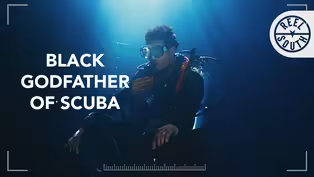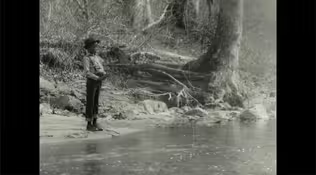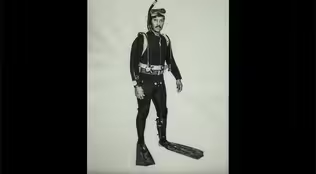
Black Godfather of Scuba
Season 10 Episode 1003 | 24m 41sVideo has Closed Captions
Dr. Albert “Doc” Jones leads the charge to preserve history through scuba diving.
Dr. Albert “Doc” Jones, founder of the National Association of Black Scuba Divers, dedicated his life to uncovering lost histories beneath the ocean. When his team found the Henrietta Marie, the first recovered slave ship, he set out to honor those lost at sea. This film celebrates his mission to recover forgotten stories and preserve them for future generations.
Problems playing video? | Closed Captioning Feedback
Problems playing video? | Closed Captioning Feedback
Support for Reel South is made possible by the National Endowment for the Arts, the Center for Asian American Media and by SouthArts.

Black Godfather of Scuba
Season 10 Episode 1003 | 24m 41sVideo has Closed Captions
Dr. Albert “Doc” Jones, founder of the National Association of Black Scuba Divers, dedicated his life to uncovering lost histories beneath the ocean. When his team found the Henrietta Marie, the first recovered slave ship, he set out to honor those lost at sea. This film celebrates his mission to recover forgotten stories and preserve them for future generations.
Problems playing video? | Closed Captioning Feedback
How to Watch REEL SOUTH
REEL SOUTH is available to stream on pbs.org and the free PBS App, available on iPhone, Apple TV, Android TV, Android smartphones, Amazon Fire TV, Amazon Fire Tablet, Roku, Samsung Smart TV, and Vizio.
Providing Support for PBS.org
Learn Moreabout PBS online sponsorship[gentle music] [gentle music] [bubbles burbling] - [Albert] Water is the giver of life, but the water is also the taker of life.
Without water, there's no life.
[water splashes] I've made Over 6,000 dives.
[gentle music continues] You do so many dives, they don't stand out unless there's something unusual.
Diving on a slave ship, that's unusual.
It all started with the Henrietta Marie.
- [Narrator] The Henrietta Marie was an English slave ship.
In 1700, after selling 191 enslaved African people in Jamaica, it sailed to the United States.
While on route, the ship sank 35 miles west of Key West Florida.
No human cargo was aboard as the ship sunk.
The Henrietta Marie acts as a stark reminder of some of the horrors that occurred during the middle passage.
[gentle music continues] [water rippling] [wake crashing] - The Henrietta Marie is a slave ship, the only slave ship that has been found in North and South America.
- Before we started working on the Henrietta Marie, we would diving, just a bunch of people getting together, enjoying themselves and dive.
But that's not the same as diving on a slave ship.
They call me Doc, because I am a doctor.
[laughs] I'm a marine biologist and environmental scientist, also a scuba diver, [bright playful music] born and raised in Washington DC.
The neighborhood that I grew up in was basically majority African American.
The neighborhoods that are only a few blocks away might have been White.
Most minority kids didn't have pools.
There was always somebody getting too far in the river.
[water splashing] Every year somebody would drown.
[water rippling] [gentle music] There's a bunch of kids that always come down to the river.
We were on the Maryland side.
The kids were on the Virginia side, and we heard 'em screaming.
[child screaming] And one of the little kids went too far in the water, and they got swept away.
[child screaming] That little girl just screamed and cried.
It was just unbelievable.
I think it was her brother or somebody.
[child screaming] [gentle music continues] People don't realize if you see a little kid drowning, it takes years to get over that.
It really upset us for a long time, you know.
They were about the same age that we were, so that could've easily been one of us.
[upbeat patriotic music] I first joined the military in 1951.
It was very common for young men to come outta high school one week and be in the military the next week.
- [Narrator] Then you are introduced to the tools of your trade.
- On the base where I was, they were teaching what they called combat swimming classes.
There was an introduction to both swimming, snorkeling, and scuba diving.
[bubbles burbling] I started to say, "Oh, this is cool.
"I can breathe underwater."
[bubbles burbling] Well, I've always been around water or with water.
It's always been part of my life, so it was only natural for me to gravitate towards scuba diving.
[gentle orchestral music] You put your gear on, you jump in the water, and you go down, and you say, "Wow!
"Look at all these colors."
Every color imaginable.
It's not like you see in the movies.
This is different.
This is new.
This is just breathtaking.
So once you learn, you look for water, any kinda water, [laughs] and you hoping you're gonna be in some place where you got nice, warm water, good visibility, but it's not always that way.
[soldiers speaking indistinctly] I was deployed to Korea.
[vehicle engine humming] [distant artillery firing] You don't understand combat til you in combat.
You can do all the training you want, but you're not really ready for it.
[artillery firing] [somber music] Almost everybody in my unit got wounded.
I got the purple heart.
[footsteps shuffling] It means that you either got wounded, injured, or killed fighting for your country.
[explosion booms] It also means that you got a whole lot of friends that didn't make it, so you don't like to talk about it.
[birds chirping] [somber music continues] - So this is your first time being at the memorial.
- [Albert] Right.
- [Jay] Wow, okay.
Is it just memories?
- [Albert] Yeah.
- [Jay] Okay.
- The one thing that bothers most combat veterans- - [Jay] Is the loud noises?
- the constant noise.
- Yeah, I remember growing up when my brother and I, whenever we made too much noise, my father would get really upset.
Later on, I understood when he told me about the noise in Korea.
[children chattering indistinctly] - You never get used to the noise.
And you never get used to getting shot at.
Only in the movies.
[artillery firing] [soldiers yelling] It's the noise.
It never stops.
[water splashing] [gentle music] [artillery firing] [soldiers yelling] Under the water, it's quiet, very quiet.
[bubbles burbling] Diving is quiet and peaceful.
Weightlessness is a form of quiet too, because you're quieting the effect of gravity.
And I don't like a whole lot of noise.
[bubbles burbling] So when I got outta the service, the diving industry became an industry and not just a fad of a bunch of crazy people jumping in the water.
It became organized.
[tambourine clashing] I went to a trade show and one of the displays was a booth for scuba divers.
[upbeat music] So I put my card in the fish bowl they have at every booth, and that gentleman in the booth came to me and said, "Gimme a card for myself," 'cause they had a habit of not getting back to Black applicants.
[horns blaring] He called me and I started going to the meetings.
I liked what I saw, so joined.
It was the same gentleman who said, "You know, Jose, you need to start your own club."
I said, "Oh no, I'll do the diving, I'll train people, "but I don't wanna start a club."
He said, "Well, we get a whole lot "of Black potential divers, "and no one ever gets back to 'em, "so if you don't do it, who's going to do it?"
[upbeat jazz music] We formed a club called Underwater Adventure Seekers in 1959.
[trumpet solo] Everybody had their favorite name, and that was just one of the names that came up, Underwater Adventure Seekers, and we'd go seek an adventure under the water.
[car door clattering] A lot of clubs named their club after animals of the sea.
We wanted to name ours after people.
And that's how we got started.
And it got a little bit bigger and a little bit bigger and a little bit bigger and a little bit bigger.
We set out to build our club that was built on pride.
- Dr. Jones actually started doing diving under the legacy of segregation.
Let's try to imagine who his dive buddies were or who his dive buddies were not.
- I was just a diver having fun.
They either admire you for doing it or they hate you for doing it.
You gotta do twice as much to get half as much.
Now everybody else can't compete with you, because they made it so hard for you that you're twice as good as everybody else.
- Yeah, there's your dad in the desert, [chuckles] and here's your dad and me.
- [Kendall] Was I the youngest person to ever go on one of your trips?
- Yeah, we had very few babies on our trips.
- [Paula] I was either gonna leave you at home or take you with us.
This was your first trip.
- [Kendall] I was cute.
[Paula laughs] Don't you think?
- Absolutely.
- [Kendall] Okay.
- [Paula] You two look like twins.
- [Kendall] We did.
[Paula chuckles] It's so clear.
- [Paula] Yeah.
[upbeat rock music] - [Interviewer] This brother has many dives under your belt.
Tell us how many dives you have under your belt, Underwater Adventure Seekers.
- We've been every place you can name.
We've dived from Australia to Africa all over the world.
So the Underwater Adventure Seekers is one of the oldest clubs in the United States and one of the best travel clubs in the United States.
- It was busy, [chuckles] very busy.
- We had a 1-800 number for the scuba club in our house.
In the middle of the night, we're getting calls from places all over the world.
- I married a scuba diver.
Every summer there was a dive trip.
- [Kendall] We didn't really go on family trips in the sense of just the three of us going on a trip.
It was always connected to like the scuba world.
[people speaking indistinctly] - Great job!
Dr. Jones has created a family within the Underwater Adventure Seekers, a community of Black divers.
It means everything.
- We were doing things that other people didn't do, not just other Black people but other people, period.
[upbeat music continues] [bubbles burbling] But it wasn't anything that we considered to be unusual until the Henrietta Marie came along.
[dramatic music] [water churning] As we went out, the weather started kicking up.
But when we got on site, oddly enough, the weather cleared up.
The sea just stop churning.
The wind stopped blowing.
The ocean got flat.
[water splashes] Once we got on site, we still had to find the Henrietta Marie.
We noted that there was a cook stove down there.
So we actually dove twice, almost two hours, looking for the exact location.
And finally, we found a baseline, and the baseline led us to the stove.
Went back up and told everybody to get dressed, and they were more than ready to get dressed, 'cause they'd been waiting there almost two hours.
[drum beating rhythmically] And we had people on the boat that were saying chants and prayers, throwing flowers on the water.
And people were actually crying.
They felt that our ancestors know we were here.
[bubbles burbling] And so we took them in two at a time.
[dramatic music continues] You're diving into history.
And you're also diving into your own history.
- Everything has an origin story.
So for me, the Henrietta Marie is the origin story of slavery.
The cargo hole of a slave ship is very, very dark.
You feel the gravity of the greatest crime committed in the history of the world.
At the same time, you feel, and you experience the greatest triumph of the human spirit, the resilience.
- Anybody in that club could have had ancestors on the Henrietta Marie.
[bubbles burbling] It was the first time that a lot of people had ever seen shackles.
[shackles clanging] It's really sad.
[bubbles burbling] It's really hard to take.
You don't want to disrespect them.
They've already lost their lives.
Don't take the last thing they got, and that's their respect.
[dramatic music continues] [pilot speaking indistinctly] [vehicle motor humming] After seeing the artifacts and seeing how it affected the people, I started thinking that we need to go out and find these ships ourselves.
[upbeat joyful music] There are probably hundreds of slave wrecks, but only a few, a handful that have been discovered.
There's this big ocean out there.
And we gotta pinpoint some places in the world we wanted to go to look for wrecks.
I went to all these places myself on my own dime, Cuba, Caribbean Basin, Ghana, Brazil, and Senegal.
- In a major discovery, a team, including the Smithsonian, has recovered the first artifacts from a slave ship.
After 300 dives, they've found dozens of artifacts, but this may be the most revealing.
- [Reporter] This kind of project involved a great deal of international collaboration.
- We are really charged, kind of our mission to tell the story to bring memory back.
- Everybody do a buddy check.
- Yeah, make sure you do a buddy check.
- [Diver] Good to go, Gail?
- Working with the slave ships really reenergized a whole bunch of the divers.
- [Diver] One, two, three, there you go.
- [Albert] They wanted to do something important, and this was something important.
We have trained approximately 500 people or more to do underwater archeology.
- [Paula] The first congratulations are for the four people who just certified.
- They're our twelve new members, new club members [indistinct].
- [Paula] All right.
[crowd clapping] - Matter of fact, there wasn't any certifications.
We wrote the certifications for it.
We wrote the textbooks for it.
We've trained 10,000 kids to swim.
Black kids in the United States have drowned at a much higher rate than the general population.
- [Jay] We have the honor and the privilege to introduce the value of submerged cultural heritage to the next generation.
With that, they are becoming stewards of the ocean.
[boat motor humming] [wake crashing] - We need to use the Henrietta Maria as a springboard to really face this slavery issue and finally put it to rest.
[gentle music] [water rippling] - [Jay] After that dive, Dr. Jones was transformed.
That's when the fire and that interest actually moved forward into action.
[water splashes] - Okay, this is your show completely.
My own concern is the current and bad visibility, and that's the only thing that scares me.
- Yeah, but we wanna make sure we don't have any of... Just two people, just maybe you on one side and me on the other side and the rest of those people back.
- The Henrietta Marie had already offloaded most of the cargo, that's what they called it.
They'd already offloaded the people before it went down, but we knew that the ship had made more than one voyage back and forth, back and forth.
Everybody didn't complete the trip.
So as far as we were concerned, the Henrietta Marie was a grave site.
So we wanted to make sure that like any grave state, that you mark it.
- On this day, we come to this place to honor our African ancestors.
Our visit here is testimony that we have not forgotten their suffering in the ocean crossings.
We believe the spirits of the multitude of African people who died in transit are still with this sunken vessel.
[bright music] [water splashes] - We said, we want to make a plaque and send the message back to Africa.
So I figured out a way to raise the money by putting the ads in our newsletter, and I explained that we're gonna put a plaque down on this slave [indistinct] that's down in Florida, and the money started coming in, little by little.
They realized this is important.
Here's an actual slave ship.
- [Jay] Paying homage to the Henrietta Marie site pays homage to our ancestors, and that experience is deeper than just a camaraderie.
Every time that you go into the water with another Black diver, it's a family reunion.
The plaque is facing east towards Africa.
It tells our ancestors that we have not forgotten.
- We want to send a message back that we acknowledge the sacrifices that they had made.
We know you're here.
We thank you for giving us life.
We're gonna turn this plaque around and send a message back to Africa.
That plaque read, "Henrietta Marie, "in memory and recognition of the courage, pain, "and suffering of enslaved African people.
"Speak her name and gently touch the souls "of our ancestors."
[bright music continues] [upbeat music] [upbeat music continues] [upbeat music continues] [upbeat music continues] [upbeat music continues] [upbeat music fades]
Black Godfather of Scuba | Official Trailer
Video has Closed Captions
Preview: S10 Ep1003 | 15s | Dr. Albert “Doc” Jones leads the charge to preserve history through scuba diving. (15s)
Video has Closed Captions
Clip: S10 Ep1003 | 1m | The founder of the National Association of Black Scuba Divers recalls a childhood memory. (1m)
The Creation of Underwater Adventure Seekers
Video has Closed Captions
Clip: S10 Ep1003 | 1m | After encountering discrimination in the Scuba diving world, Dr. Jones forms his own club. (1m)
Providing Support for PBS.org
Learn Moreabout PBS online sponsorshipSupport for PBS provided by:
Support for Reel South is made possible by the National Endowment for the Arts, the Center for Asian American Media and by SouthArts.

















